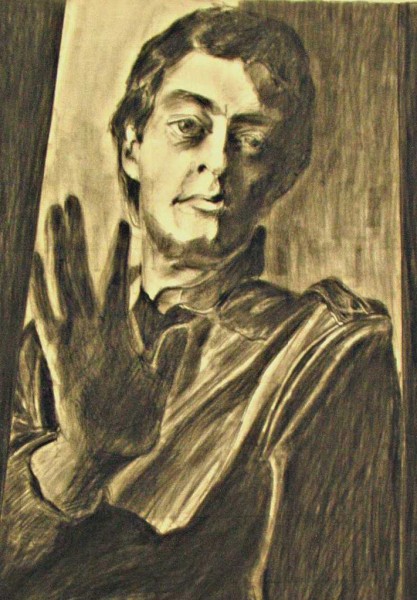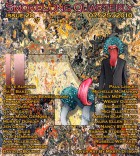Once a year, at the house on the farm. Two days at most—you can arrive in the morning and leave after noon the next day. Why is she so insistent? They’re your family, not hers, and she doesn’t like them any more than you like to go back there.
But you go, of course. Every year you go.
This time of year the sun will not shine on that land. The wet, gray sky is no surprise, nor the leafless trees, the air knifing through outer and inner clothing, swirling up under the legs of pants.
Get out of the car, she says. Get out of the car or you’ll sit here for the next hour, like you did last year.
You knock on the wooden frame door, not dwelling on the peeling paint or the holes in the screen or the spring stretched out of serviceable shape so the door will hang open when you’ve gone in. You don’t dwell on the gray shingle siding that you’ve always hated, the cracked concrete steps beneath your feet, or the fact that this catalog of things you are ignoring is designed to put off that moment when you push the door open and they are there.
For the love of God, will you go in, she says and pushes you from behind. You open the door and are there, inside the house. Is this good enough, you want to say, can we go home now?
She invokes God again, says she is not your therapist, and this is not some guided imagery exercise and you’ve made a breakthrough and your time is up, come back next week and we’ll pick it up here.
You’ve come into the tiny kitchen where there should be heat from the oven and smells, roasting bird and baking bread, three generations tracing the tight triangle from table to stove to sink. Instead, the kitchen is empty, almost as cold as outside. The overhead light is bare, yellow white, like the sun if it were to wheedle some face time from the almost snowy skies.
She doesn’t even have to say it. Stop looking out the window, you’re procrastinating.
They’re all in the living room. Through the narrow, dark hallway, into the largest room in the house. Cousins on the worn, stuffed sofa, faces tired as the dim lamps whose bulbs are the only light in the room. Your father, sitting stiffly in his easy chair, your mother in the opposite corner, in a severe, straight-backed chair, heads down. He’s reading his old Bible, she the Reader’s Digest.
I’m here, we’re here, you say.
We thought we’d go in to town, your father says, looking up, closing his Bible. Less trouble that way. Your mother’s not up to doing the dinner.
Your mother finally looks at you. We thought you weren’t coming this year, she says.
We come every year, you say.
That’s right, she says. You do.
Your mother calls the cousins the ones who stayed. She doesn’t need to tell them she appreciates that they’ve always been there. They’ve kept the place up since your father grew weaker. Your cousins have driven them both to doctors and market and church on Sundays, have seen the change of seasons with them. One by one, the cousins stand, stretch in turn like notes in an arpeggio, come over and hug the two of you.
At dinner, there will be no wine, but there will be talk. One cousin will remind you of the city girl who visited family down the road in summer, who watched Alfred Hitchcock and Twilight Zone and told all the stories. He wonders whatever came of her.
A cousin will talk about high school and stealing outhouses at homecoming, and the damage he did the first time he drove a tractor, and how the only growth industry in the county is meth.
The oldest cousin, the one who’s taken charge, will reach across the table, put one hand on yours, and one on your wife’s. Sometimes it’s not for you, it’s for the ones who stayed, he says. There’s no reproach or condemnation or wishing things had been different. It’s blessing and benediction and recognition that everyone does what they have to do.
Between now and that moment, though, you have to cross the room, take your mother’s face in your hands and say, I’m home.



 The core workshop of SmokeLong Fitness is all in writing, so you can take part from anywhere at anytime. We are excited about creating a supportive, consistent and structured environment for flash writers to work on their craft in a community. We are thrilled and proud to say that our workshop participants have won, placed, or been listed in every major flash competition. Community works.
The core workshop of SmokeLong Fitness is all in writing, so you can take part from anywhere at anytime. We are excited about creating a supportive, consistent and structured environment for flash writers to work on their craft in a community. We are thrilled and proud to say that our workshop participants have won, placed, or been listed in every major flash competition. Community works.